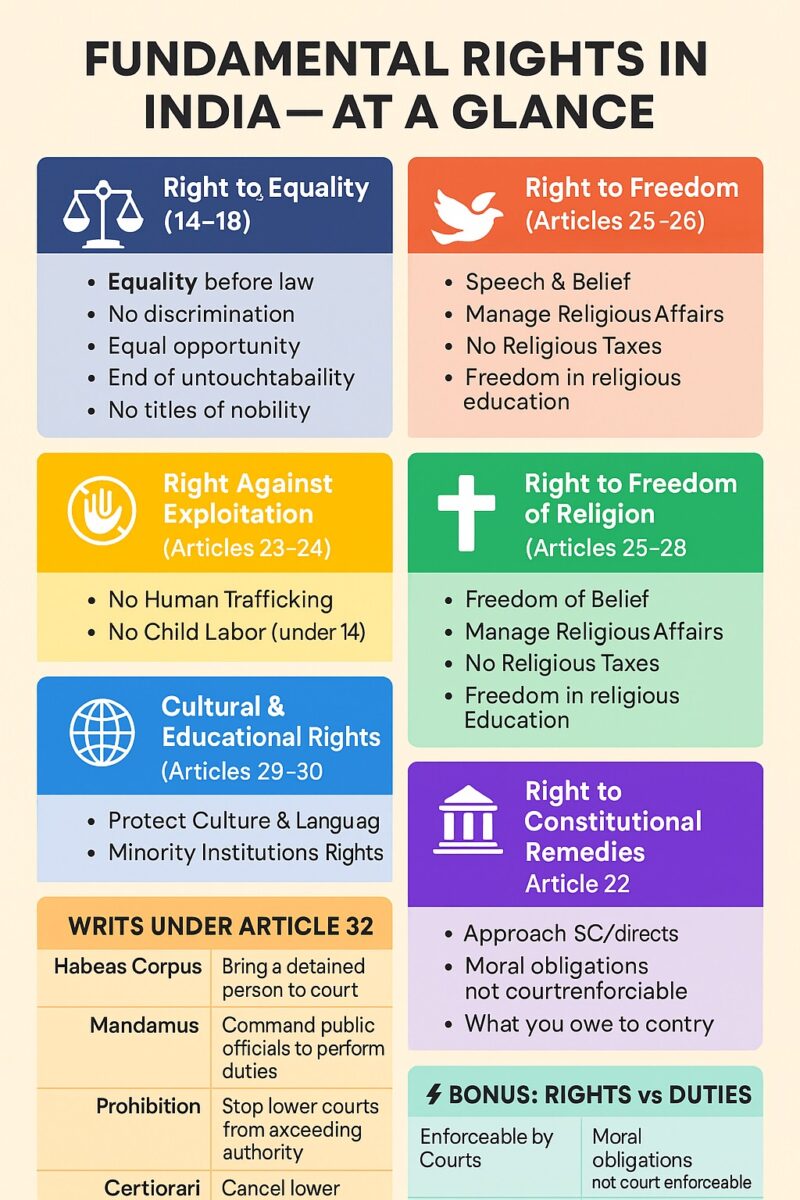🇮🇳 Discover Your Fundamental Rights in India! 🇮🇳
Think of Fundamental Rights as your personal shield 🛡️, guaranteed by the Constitution of India. They ensure everyone gets respect, dignity, and equality, protecting you from unfair actions by the state. These are the basic human rights for every citizen, no matter their race, religion, gender, or birthplace.
Where are they found?
In Part III of the Indian Constitution, specifically Articles 12 to 35. This part is so important, it’s often called the Magna Carta of India!
Why are they important?
- They protect your liberty and freedom.
- They prevent the government from becoming too powerful or dictatorial.
- They are crucial for your personal growth and the nation’s development.
- They act as a check on the government’s actions.

✨ The 6 Pillars: Your Fundamental Rights Explained ✨
Here’s a breakdown of the six main categories of rights you possess:
1. Right to Equality (Articles 14-18) ⚖️
- What it means: Everyone is equal before the law! No special treatment for anyone. The law protects everyone equally.
- Key Guarantees:
- ✅ Equality Before Law (Art. 14): No one is above the law.
- 🚫 No Discrimination (Art. 15): The state cannot discriminate based on religion, race, caste, sex, or place of birth.
- 🧑💼 Equal Opportunity (Art. 16): Everyone gets an equal chance in government employment matters.
- ❌ Abolition of Untouchability (Art. 17): Practising untouchability is forbidden.
- 🎖️ Abolition of Titles (Art. 18): No hereditary titles of nobility are allowed (like Raja, Maharaja).
2. Right to Freedom (Articles 19-22) 🕊️
- What it means: You have essential personal freedoms!
- Key Freedoms (Art. 19):
- 🗣️ Freedom of speech and expression.
- 🤝 Freedom to assemble peacefully (without weapons).
- 👥 Freedom to form associations or unions.
- 🚶 Freedom to move freely throughout India.
- 🏠 Freedom to reside and settle anywhere in India.
- 💼 Freedom to practice any profession, trade, or business.
- Other Protections:
- 🛡️ Protection Regarding Conviction (Art. 20): Protection against unfair punishment.
- ❤️ Protection of Life & Personal Liberty (Art. 21): Your right to live and be free. (This is interpreted very broadly by courts!)
- 📚 Right to Education (Art. 21A): Free and compulsory education for children (age 6-14).
- 🔒 Protection Against Arrest & Detention (Art. 22): Rights if you are arrested or detained.
3. Right Against Exploitation (Articles 23-24) 🛑
- What it means: Protection from being exploited or forced to work.
- Key Protections:
- 🙅 Ban on Human Trafficking & Forced Labour (Art. 23): Includes practices like ‘begar’ (forced work without pay).
- 🧒 Ban on Child Labour (Art. 24): Prohibits employing children under 14 in hazardous jobs (factories, mines, etc.).
4. Right to Freedom of Religion (Articles 25-28) 🙏🕉️☪️✝️☸️✡️
- What it means: You have the freedom to follow your faith.
- Key Aspects:
- ✝️ Freedom of Conscience & Religion (Art. 25): Freedom to believe, practice, and share your religion.
- ⛪ Manage Religious Affairs (Art. 26): Religious groups can manage their own affairs.
- 💰 No Taxes for Promoting Religion (Art. 27): Freedom from paying taxes specifically to promote a particular religion.
- 🎓 Religious Instruction Freedom (Art. 28): Rules about religious teaching in educational institutions.
5. Cultural and Educational Rights (Articles 29-30) 🎭📚
- What it means: Protecting diverse cultures and ensuring educational rights, especially for minorities.
- Key Rights:
- 🌍 Protection of Interests of Minorities (Art. 29): Right to conserve distinct language, script, and culture. No denial of admission to state-aided institutions based on religion, race, caste, language.
- 🏫 Minority Educational Institutions (Art. 30): Minorities have the right to establish and run their own educational institutions.
6. Right to Constitutional Remedies (Article 32) 🏛️💡
- What it means: This is your master key! If any of your Fundamental Rights are violated, you can directly approach the Supreme Court (or High Courts under Art. 226) to get them enforced.
- The Court’s Tools (Writs): The courts can issue special orders called writs:
- Habeas Corpus: To produce a detained person before the court.
- Mandamus: To order a public official to do their duty.
- Prohibition: To stop a lower court from exceeding its jurisdiction.
- Certiorari: To quash an order of a lower court.
- Quo Warranto: To question the legality of a person holding a public office.
- Other Related Articles (33-35): These allow Parliament to modify rights for armed forces, impose restrictions during martial law, and make laws to enforce these rights.
🤔 Fundamental Rights vs. Fundamental Duties
- Rights: Are guaranteed to you by the Constitution and are enforceable by courts. Think of them as what the country promises you.
- Duties: Are expected from you as a citizen (added by the 42nd Amendment, 1976). Think of them as your contribution to the country. They are not directly enforceable by courts in the same way rights are.
❓ FAQ Spotlight: What is “Equal Protection of Laws”?
It means the law must operate equally for everyone under similar circumstances. If two people commit the same crime under similar conditions, they should face the same legal consequences, regardless of their background. It ensures fairness and prevents the government from treating people differently without a valid reason.
Understanding your Fundamental Rights empowers you as a citizen. They are the bedrock of India’s democracy! 🌟
